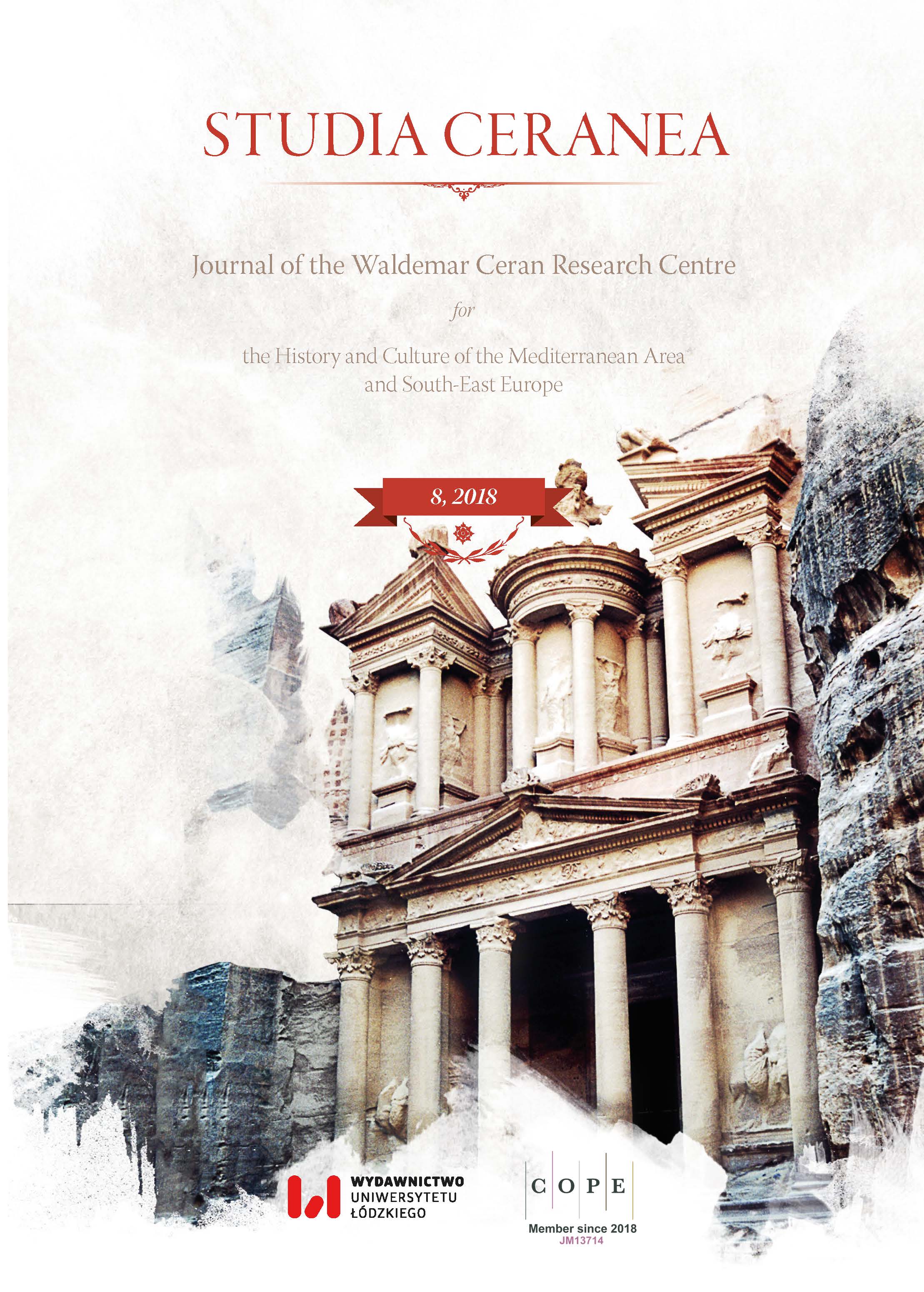Circe and Rome. The Origin of the Legend
DOI:
https://doi.org/10.18778/2084-140X.08.04Słowa kluczowe:
Circe, myth, history of Roman Italy, ancient and Byzantine scholarly worksAbstrakt
Circe is associated first of all with the episode narrated in the 10th book of the Odyssey, in which she turns Odysseus’s crewmen into pigs using her herbal pharmaka. Odysseus survives due to divine help, his inborn cleverness, and the miraculous herb moly. The fairy-tale theme of the spells of Circe, clearly showing its folk provenance, got entrenched in ancient literature: featured most often in poems of playful content, Circe symbolized the power to subjugate male souls and bodies. From the Hellenistic era to the Byzantine times, however, Circe is mentioned in scholarly works – in the context of the history of Roman Italy. The aim of the present article is, first of all, to analyse the Greek-language source texts and show the ways in which ancient authors managed to connect a character from a folk fairy tale – intrinsically different in form and not identifiable with any heroic myth – with the prehistory of Roman Italy, and even place her among the ancestors of Rome. The considerations also allow us to identify some of the mechanisms of the creation and functioning of the legend as a cultural phenomenon of the ancient world.
Pobrania
Bibliografia
Apollonius Rhodius, Argonautica, ed. H.Fränkel, Oxford 1961 [= Scriptorum Classicorum Bibliotheca Oxoniensis].
Google Scholar
Cassianus Bassus, Geoponica sive Cassiani Bassi Scholastici de re rustica eclogae, ed. H. Beckh, Leipzig 1895 [= Bibliotheca scriptorum Graecorum et Romanorum Teubneriana].
Google Scholar
Dionysii Halicarnasei antiquitatum Romanarum quae supersunt, vol. I–II, ed. C. Jacoby, Leipzig 1885–1888 [= Bibliotheca scriptorum Graecorum et Romanorum Teubneriana].
Google Scholar
Eustathius, Commentarium in Dionysii periegetae orbis descriptionem, [in:] Geographi Graeci minores, vol. II, ed. K. Müller, Paris 1861.
Google Scholar
Georgius Syncellus, Ecloga chronographica, ed. A.A. Mosshammer, Leipzig 1984 [= Bibliotheca scriptorum Graecorum et Romanorum Teubneriana].
Google Scholar
Herodianus, De prosodia catholica, [in:] Grammatici Graeci, ed. A. Lentz, vol. III.1, Leipzig 1867.
Google Scholar
Hesiodus, Theogonia, ed. M.L. West, Oxford 1966.
Google Scholar
Ioannus Lydus, De mensibus, ed. R. Wünsch, Leipzig 1898 [repr. Stuttgart 1967].
Google Scholar
Philostephanus Cyrenaeus, Fragmenta, [in:] Fragmenta historicorum graecorum, vol. I–V, ed. C. Müller, Paris 1841–1870.
Google Scholar
Plutarchi vitae parallelae, vol. I.1, ed. K. Ziegler, Leipzig 1969 [= Bibliotheca scriptorum Graecorum et Romanorum Teubneriana].
Google Scholar
Procopius Caesarensis, De bellis, [in:] Procopii Caesariensis opera omnia, vol. I–II, ed. G. Wirth, J. Haury, Leipzig 1962–1963 [= Bibliotheca scriptorum Graecorum et Romanorum Teubneriana].
Google Scholar
Stephanus Byzantius, Ethnica (epitome), ed. A. Meineke, Berlin 1849.
Google Scholar
Strabo, Geographica, ed. A. Meineke, vol. I–III, Leipzig 1877.
Google Scholar
Apollonius Rhodius, The Argonautica, trans. R.C. Seaton, London 1912 [= Loeb Classical Library, 1].
Google Scholar
The Geography of Strabo, vol. I–III, trans. H.C. Hamilton, W. Falconer, London 1903–1906.
Google Scholar
Hesiod, The Homeric Hymns and Homerica, trans. H.G. Evelyn-White, London 1914 [= Loeb Classical Library, 57].
Google Scholar
John Lydus, On the Months (De mensibus), trans. et ed. M. Hooker, 2017, http://www.roger-pearse.com/weblog/wp-content/uploads/2017/12/John-Lydus-On-the-Months-tr.-Hooker-2nd-ed.-2017-1.pdf [28 I 2018].
Google Scholar
Plutarch’s Lives, vol. I, trans. B. Perrin, London 1914 [= Loeb Classical Library, 46].
Google Scholar
Procopius, History of the Wars, vol. III, Books 5 – 6.15. (Gothic War), trans. H.B. Dewing, Cambridge Massachusetts 1916 [= Loeb Classical Library, 107].
Google Scholar
The Roman Antiquities of Dionysius of Halicarnassus, trans. E. Cary, London 1879.
Google Scholar
Barron J.P., Hesiod, [in:] The Cambridge History of Classical Literature, vol. I, Greek Literature, ed. P.E. Easterling, E.J. Kenney, Cambridge 1987, p. 96–97.
Google Scholar
Bartol K., Danielewicz J., Komedia grecka od Epicharma do Menandra. Wybór fragmentów, Warszawa 2011.
Google Scholar
Bobrowski A., “Dziennik wojny trojańskiej” Diktysa z Krety. Studium historycznoliterackie, Kraków 2009.
Google Scholar
Kirk G.S., Homer, [in:] The Cambridge History of Classical Literature, vol. I, Greek Literature, ed. P.E. Easterling, E.J. Kenney, Cambridge 1987, p. 85–91.
Google Scholar
Kobus-Zalewska H., Wątki i elementy mityczne w epigramach Antologii Palatyńskiej, Wrocław 1998 [= Archiwum Filologiczne, 54].
Google Scholar
Rostropowicz J., Apolloniosa z Rodos epos o Argonautach, Opole 1988.
Google Scholar
Rybowska J., Hekate – bogini o wielu twarzach, [in:] Czary, alchemia, opętanie w kulturze na przestrzeni stuleci. Studia przypadków, ed. J. Pietrzak-Thébault, Ł. Cybulski, Warszawa 2015, p. 53–68.
Google Scholar
Stabryła S., Wergiliusz. Świat poetycki, 2Wrocław 1987.
Google Scholar
Zalewska-Jura H., Mythical Motifs in Early Byzantine Epigrams, [in:] The Metamorphoses of Ancient Myths, ed. M. Budzowska, B.Ídem Dinçel, J. Czerwińska, K. Chiżyńska, Frankfurt am Main 2017, p. 103–109.
Google Scholar
Zalewska-Jura H., W rytmie sikinnis. Studium nad warstwą aluzji i podtekstów w greckim dramacie satyrowym, Łodź 2006 [= Rozprawy Habilitacyjne Uniwersytetu Łodzkiego].
Google Scholar
Pobrania
Opublikowane
Jak cytować
Numer
Dział
Licencja
Prawa autorskie (c) 2018 Hanna Zalewska-Jura

Utwór dostępny jest na licencji Creative Commons Uznanie autorstwa – Użycie niekomercyjne – Bez utworów zależnych 4.0 Międzynarodowe.














